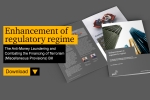
Part of "Tax Mind": A collection of thought provoking content for tax professionals.
The need for a standard tax approach - IFRS 16 (Leases)

Background
In January 2016, the International Accounting Standards Board (‘IASB’) issued IFRS 16 replacing IAS 17. IFRS 16 has fundamentally changed accounting for operating leases.
IFRS 16 became effective as from 01 January 2019 in Mauritius and has a major impact on the accounting and tax treatment for lessees of property and high-value equipment.
Browse this page
Introducing IFRS 16
An operating lease, by definition, is a contract between the lessee and the lessor which gives the lessee the right to use an asset for a period of time against a consideration paid to the lessor. The lessor retains the legal title to the asset. Thus, under IAS 17, operating lease contracts were treated as mutually unexecuted at signing.
This meant that a lessee was not required to record a liability corresponding to future lease payments in the balance sheet. The new rules under IFRS 16 require the lessee to primarily recognise almost all lease contracts on the balance sheet.
Accounting Treatment under IAS 17
Mr. X enters into a contract to lease an office building for a lease cost of Rs 100,000 per annum for 5 years. The accounting entries are:
Account |
Debit (Rs) |
Credit (Rs) |
|---|---|---|
Dr Annual Lease Rental Expense |
100,000 |
|
Cr Bank |
100,000 |
Tax treatment under IAS 17
Lessee
The lessee claims the lease rental payments made to the lessor as a deduction for tax purposes.
Lessor
The lessor pays tax on the lease rental income. However, as the owner of the asset, the lessor claims capital allowance on the leased property.
Accounting Treatment under IFRS 16
Lessee
The lessee recognises a right of use (‘ROU’) asset (Dr) and a corresponding liability (Cr) at the present value (PV) of future lease payments in the balance sheet. Any lease payments made reduces the lease liability as well as the ROU asset. So, in the above example, the present value of the annual rental payment of Rs 100,000 at a discount rate of 5% is Rs 432,940 (on the assumption that the life of the asset is 5 years).
The Rs 432,940 is recorded as a ROU asset with a corresponding lease liability of the same amount.
Account |
Debit (Rs) |
Crebit (Rs) |
|---|---|---|
Start of year 1 |
||
Dr ROU Asset |
432,940 |
|
Cr Lease liability |
432,940 |
|
End of year 1 |
||
Dr Interest expense |
21,647 |
|
Dr Lease liability |
78,353 |
|
Cr Cash |
100,000 |
|
Dr Depreciation |
86,588 |
|
Cr Accumulated Depreciation |
86,588 |
|
Lessor
The accounting for the lessor remains unchanged but now he has new disclosure requirements. For instance, the lessor must, amongst others, disclose additional information on how he manages the risks related to his residual interest in leased assets.
Tax treatment under IFRS 16 – Operating Lease
Lessor
The tax consequences for the lessor remain unchanged, i.e. he claims capital allowances on the leased asset and the lease rental income is taxable.
Lessee
So far, there is no universal tax treatment in respect of assets under operating leases. In most countries, an asset attracts capital allowance, and broadly this raises questions whether the ROU asset should also be eligible for capital allowance. Or, should we rather stick to the traditional and simple approach of only allowing the lease payments as tax deduction?
Countries like Singapore have already published guidelines regarding the tax treatment to adopt. In its e-Tax guide issued on 08 October 2018, the Inland Revenue Authority of Singapore stated that for operating leases, lessees are allowed to claim tax deductions based on the contractual lease payments incurred, except under circumstances when a sale is regarded to have taken place. On the other hand, interest expense and depreciation charged to the profit or loss account would have to be added back in the tax computation.
There is no specific provision dealing with finance and operating leases under the Mauritius Income Tax Act (‘ITA’). The Mauritius Revenue Authority (‘MRA’) is yet to issue guidance on IFRS 16, and there may be varying practices being adopted among tax practitioners under the new IFRS16. Some may opt to take (i) the lease payments as deduction while others may prefer to (ii) claim annual capital allowance on the ROU asset. This will give different tax positions, both from an income tax and a deferred tax perspective.
Under the ITA, a person can claim capital allowance at the rate of 5% (i.e. a life of 20 years for tax purposes) on an asset that is subject to depreciation under the normal accounting rules. This may be the technical foundation to claim capital allowance on the ROU asset. However, this approach may lead to absurd results, mismatch and especially a huge balancing adjustment if the asset is sold well before 20 years.
Tax treatment under IFRS 16 – Operating Lease (continue)
The position taken by PwC Mauritius is to claim a deduction in respect of the lease payments and to disallow the amortisation of the ROU asset and the interest charged on the lease. This approach is simpler and avoids any mismatch. But fundamentally, this approach aligns with the tax treatment under the old IAS 17 as well as acknowledges the concept of substance over form.
Tax computation (PwC approach) |
Rs |
|---|---|
Net Profit as per Income Statement |
xxxxxx |
Add back |
|
Depreciation |
86,588 |
Interest |
21,647 |
Less |
|
Lease payment |
(100,000) |
Tax adjusted profit |
xxxxxx |
The MRA regularly issues practice notes and communiqués to address tax issues, and this is welcomed by both the industry and tax practitioners. At PwC Mauritius, we consider that IFRS 16 is an area where the MRA should issue some guidance to promote a consistent treatment but, more importantly, to provide certainty to taxpayers.
Author
Manisha Soockeea
Senior Tax Consultant


















